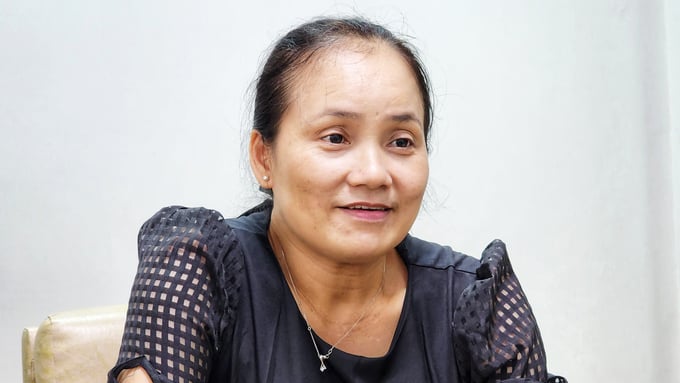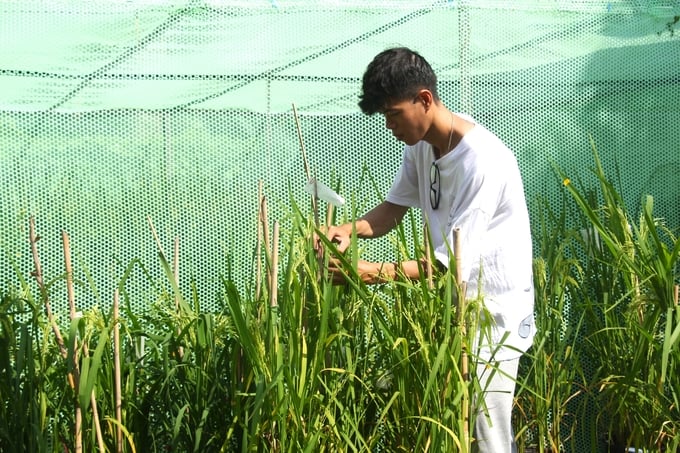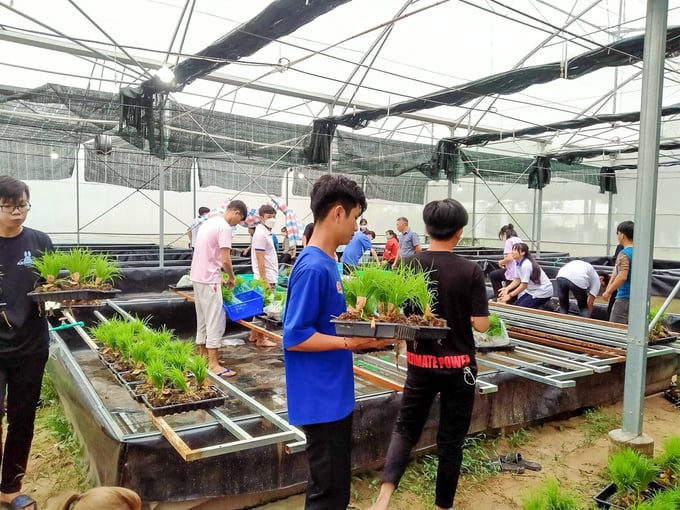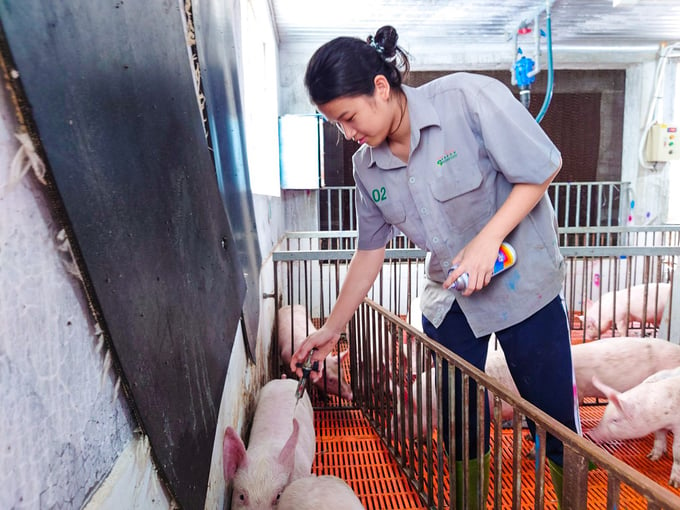May 31, 2025 | 09:36 GMT +7
May 31, 2025 | 09:36 GMT +7
Hotline: 0913.378.918
May 31, 2025 | 09:36 GMT +7
Hotline: 0913.378.918
In the academic year 2023 - 2024, Can Tho University is expected to recruit more than 7,600 students for 89 majors of regular university programs and 14 fields of advanced and high-quality programs. In which, there are 12 majors in the field of agriculture, setting the target of recruiting 920 students.
According to Dr. Nguyen Thi Kim Khang, Vice Rector of the College of Agriculture - Can Tho University, the school has performed quite well in the enrollment work by organizing a counseling day or directly going to high school to provide career orientation, but since 2022 the college is very concerned as the number of students enrolling in agricultural majors tends to decrease. Even some traditional majors such as animal husbandry or plant protection only reach 67 - 70% of the enrollment quota, not meeting the targets set by the College of Agriculture.

Dr. Nguyen Thi Kim Khang, Vice Rector of the College of Agriculture - Can Tho University, said that the college has made changes in enrollment and training activities to match the new needs of human resources in agriculture. Photo: Kim Anh.
“Although the college has tried to apply all forms of communication to share about training professions, social needs and the high rate of students having jobs after graduation, it is still not enough to capture the students’ interest.”
Explaining this phenomenon, the leader of the College of Agriculture said that most students at present choose a career according to their preferences as well as parents' reluctancy. This mentality makes the agricultural sector not attractive to candidates.
“Regarding the characteristics of the agricultural industry, to be able to become an experienced, knowledgeable and confident agricultural engineer, students have no choice but to get in the field and farm and do some real work. The fear of having burdensome and hard jobs compared to other majors results in fewer students choosing agricultural majors," said Dr. Khang.

The fear of hard work compared to other majors makes the choice of students to study agriculture majors very little. Photo: Kim Anh.
In that context, in order to adapt vocational training in adaptation to market needs, the College of Agriculture has made some changes, closing down majors that do not meet enrollment quotas after a period of opening.
For example, in the field of study of Breeding and Animal Technology, due to the distinction between professions, specializations, and degrees, many recruitment agencies are not widely known, leading to more difficult admissions, forcing the college to close this major.
In the case of the Veterinary Medicine major, the College of Agriculture has also stopped enrolling students for the past 2 years. Dr. Khang assesses that this field of study is in high demand in society, but the teaching staff of the college have expertise leaning towards the field of veterinary diagnosis. The teaching force in the field of veterinary medicine is still too thin to meet the quality of teaching, so it is expected that in 2024 the college will reinitiate the enrollment process because a force of staff who have completed training missions abroad will soon return.
The College of Agriculture is one of the units that have strong associations with businesses, training human resources according to actual needs. This method not only meets the business side’s professional and industry requirements but also solves the problem of employment for students after graduation, well satisfying the students’ desire for income.
Most recently, the college has implemented the program "Create your future" in association with De Heus Company. The goal of this program is to train so that students can attain high skills and technical English language to meet De Heus's job requirements. The program is about to end the fourth training course, and graduates can work directly at enterprises without having to undergo retraining.
GreenFeed Group has a joint training program "Talent Seeds" entering the third course. Launched at the end of 2020, the program has over 60 students majoring in Animal Husbandry, Veterinary Medicine, Agronomy, Genetics and Plant Breeding.

Students participate in internships on farms to consolidate and strengthen the knowledge they have learned at school. Photo: Kim Anh.
Currently, the fields of animal husbandry and veterinary medicine are in great demand for human resources. Students will have more job options after graduation, for example, working in laboratories, trading markets or working as technical consultants.
Contrary to the orientation of working in agencies and businesses, students majoring in animal husbandry usually tend to have this desire of opening a veterinary drug store but have difficulties in terms of degrees and practice certificates.
Vice Rector Khang said that starting from course 28 (2002 - 2006), according to the regulations of the Ministry of Education and Training, students' diplomas began to clearly indicate two different disciplines, Livestock Engineer and Veterinarian.
When opening a veterinary drug store, regular university graduates majoring in Animal Husbandry are not eligible for a business license because they do not have a veterinary practice certificate despite the training program between Animal Husbandry and Veterinary Medicine only having a 30% difference. Meanwhile, in the past, students of the mentioned two disciplines graduating from school will receive a Livestock Veterinary Engineer degree.

Animal husbandry students, when working at veterinary drug stores, are required to have a veterinary practice certificate while the training program between Animal Husbandry and Veterinary Medicine is not that big of a difference. Photo: Kim Anh.
“Currently, there are only two institutions in the country that get permission from the Ministry of Education and Training to open a pilot program specializing in Animal Husbandry and Veterinary Medicine: Vietnam Academy of Agriculture (under the Ministry of Agriculture and Rural Development) and Hue University of Agriculture and Forestry (under the Hue University).
“The control of veterinary medicine business activities at the local animal husbandry and veterinary departments is fairly tight, with very specific regulations on qualifications. Particularly in the Mekong Delta, students who have graduated from animal husbandry majors wishing to grasp the opportunities and run their own veterinary drug store must take an additional 1 - 1.5 years to participate in a distance training program specialized in veterinary medicine (study and work at the same time).
“For students who have been oriented to open a veterinary drug store since their first years of university, they must study Animal Husbandry in parallel with the second major, Veterinary Medicine, to meet all conditions,” said Dr. Khang.
Translated by Samuel Pham

(VAN) Several scientists and farmers are experimenting with soil treatment in some key durian-growing regions such as Cai Lay (Tien Giang), Dak Song, Gia Nghia, and Dak R’lap (Dak Nong).
/2025/05/25/4127-3-073637_820.jpg)
(VAN) Thanks to the promotion from an FAO-implemented project, vegetable production in greenhouses in Moc Chau has seen strong development, from 1.5 hectares in 2021 to nearly 50 hectares in 2024.

(VAN) FAO has recently supported USD 140,000 to implement the project 'Risk mitigation human-animal interface risks through disease control initiatives in pig farming.'

(VAN) The People's Committee of Tra Vinh province has approved an adjustment to the investment policy for the Green Hydrogen Plant project, increasing its area to approximately 52.76 hectares.
![Reducing emissions from rice fields: [2] Farmers’ commitment to the soil](https://t.ex-cdn.com/nongnghiepmoitruong.vn/608w/files/news/2025/05/05/dsc08881jpg-nongnghiep-140632.jpg)
(VAN) Clean rice cultivation model in Thuong Tan commune, Bac Tan Uyen district, is assisting local residents in achieving sustainable agriculture by substantially reducing costs, increasing productivity, and protecting the environment.

(VAN) At the conference to disseminate Resolution No. 68, AgriS introduced its digital agricultural ecosystem and reaffirmed its commitment to accompanying the Government in promoting private sector development and sustainable agriculture.

(VAN) 'Blue Ocean - Blue Foods' initiative is designed to restore marine ecosystems and establish sustainable livelihoods for local communities by cultivating a minimum of 1,000 hectares of cottonii seaweed in the first three years.